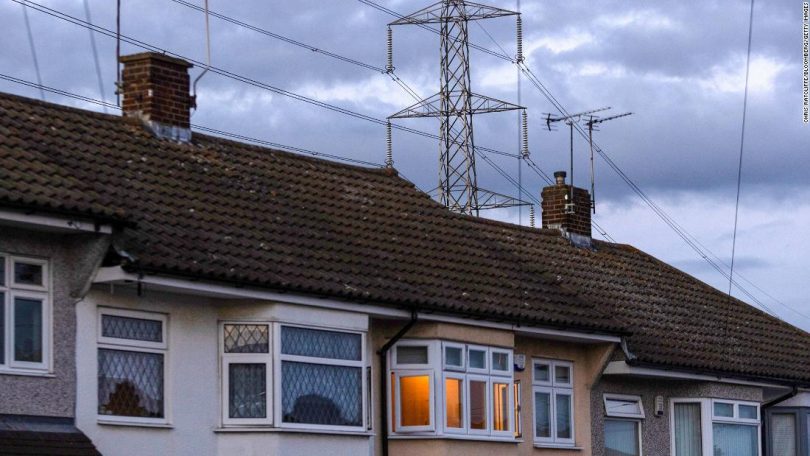[ad_1]
But UK energy prices are now higher than in comparable economies like France and Italy, analysts told CNN Business. And Brits have suffered much bigger price increases than in most European countries, including Germany, where decades of energy policy has been turned on its head by the Ukraine war.
The Office for National Statistics said this week that UK natural gas prices rose nearly 96% in the year to July, while electricity prices are up 54%.
Annual consumer price inflation for gas and electricity in the United Kingdom is forecast to soar to an average of around 80% this year, compared to an average of 40% across the 19 countries that use the euro, analysis from Deutsche Bank shows.
A broken market
The way the British government designed the energy market made this more likely, Henning Gloystein, director of energy, climate and resources at Eurasia Group, told CNN Business. Smaller companies were acting like brokers rather than providers of an essential utility.
“Many UK retail energy providers weren’t real energy producers. Instead, they bought electricity and gas in the wholesale market and then sold it on to retail customers like households,” Gloystein said.
That meant that as soon as wholesale costs increased far above what suppliers could legally charge, they went bankrupt.
The prices UK households pay are subject to a cap, but it is adjusted every six months — a period about to be cut to three — meaning bills rise more quickly in line with wholesale costs.
“There’s a transitional arrangement between now and when we move to that full quarterly model that’s pushing up prices a little bit more,” Sanjay Raja, Deutsche Bank’s chief UK economist, told CNN Business. “Suppliers are able to pass on the increases in wholesale gas prices a lot more quickly than they were in the past,” he added.
Lack of storage
The United Kingdom has faced a “perfect storm” of events which have bumped up energy bills, according to Raja.
The country also relies on gas to generate 40% of its electricity, compared to less than one fifth for the bloc as a whole, according to Deutsche Bank.
“It’s a double whammy effect and the UK’s overdependence on gas is a big reason why gas prices I think in the UK are a little bit more elevated than elsewhere,” he said.
While the United Kingdom produces about half of its gas, North Sea output last year fell to its lowest level on record due to maintenance work, according to the government’s business department.
UK natural gas contracts for next year’s first quarter are nearly 7% more expensive than European benchmark contract prices, according to analysis by Auxilione. That’s because Europe has now built a buffer for the winter months.
“We’re much more reliant on the here and now when it gets to winter,” he said.
Europe’s gas is still eye-wateringly expensive. It was trading at €242 ($244) per megawatt hour on Friday, an all-time high, according to Auxilione. That’s much higher than the spot price for UK gas, which is trading at an equivalent of €160 ($161) per megawatt hour, but the differential is driven mostly by greater demand in Europe as it fills up its tanks for winter.
Minimal government support
But the “elephant in the room,” said Raja, is that none of the support offered by the UK government so far has directly subsidized consumer energy prices. Earlier this year, the government announced a £150 rebate on a local tax for millions of households to help ease the pain.
More help is coming soon, but it won’t be anywhere near enough, according to anti-poverty campaigners.
In May, the government announced a £15 billion ($18 billion) package of support, including a £400 ($482) credit to 29 million households from October, which will be spread over six months.
By comparison, France has capped electricity price increases to 4% until the end of the year.
Other countries “have had more direct intervention when it comes to energy prices, so comparatively UK gas and electricity prices are running a little bit higher,” Raja added.
The opposition Labour Party is calling for a windfall tax on the profits of oil and gas companies to be extended to help fund a freeze on energy bills this winter.
— Mark Thompson contributed reporting.
[ad_2]
Source link








